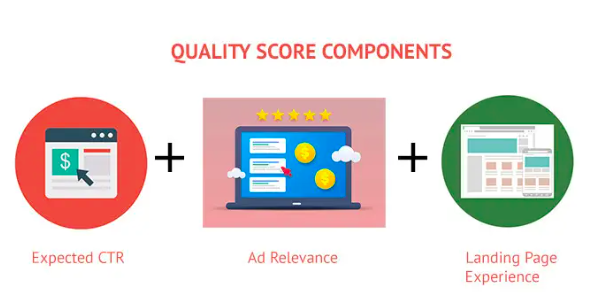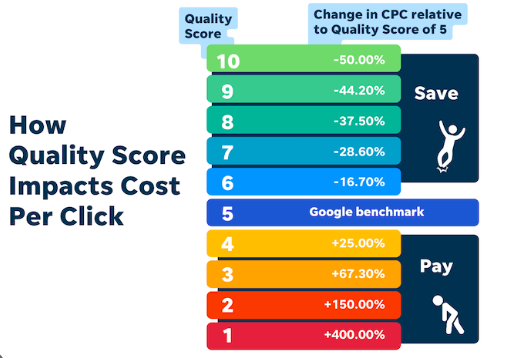As with any business, one of Google’s top priorities is to ensure that customers have an enjoyable experience which makes them want to return to their business and utilize them again. In Google’s case, they want to ensure that users find the relevant and accurate information they are looking for so that they will return to Google the next time they need to do a search. For organic results this is a very straightforward process, Google returns the most reliable and relevant information at the top of the search results to ensure the highest visibility based upon their confidential algorithm.
Google Ad results are a different story. Since advertisers are paying for placements in an auction system, Google needed to implement a process which still ensured users were still being returned relevant information. This is why Google created the quality score metric. Quality score is a relevancy multiplier added to an advertisers bid. The more relevant Google finds an advertiser, the lower the dollar amount needed to maintain the same position within the search engine results page.
What are the components of quality score?
The components of quality score are ad relevance, expected click through rate and landing page experience.
Per Google Ads Support
Google’s goal with quality score is to incentivize advertisers to provide the highest level of user experience to Google’s users. This is true from the moment an ad is displayed on search results to when a user clicks on the ad and lands on the advertiser’s website.
What is ad relevancy?
Ad relevancy is the rating of how well the content of an advertisers creative matches to the keyword they are trying to target.
Ad relevancy is the easiest aspect of quality score for a Google Ad manager to control. By keeping the words and ideas within a text ad relevant to the keyword which an advertiser is targeting they will pay less to maintain the same position in search results when compared with an advertiser who has a lower quality score.

What is landing page experience?
Landing page experience is the measurement of how relevant and useful the web page the user is being directed to is.
Advertisers want to ensure their landing pages utilize the same best practices that would be implemented as part of a search engine optimization program. Not only should the page be technically sound by being secure and loading quickly, but the content of the landing page should also be relevant to the keyword and ad which is associated with it.
What is expected click through rate?
Expected click through rate is a measurement of how likely an ad is to receive a click when shown in search results.
Per Google Support Documents
Expected click through rate is the most vague of the three components of quintuple score and can be most difficult for a Google Ads manager to solely make an impact on.
In order to determine expected click through rate, Google utilizes the historical performance of the keyword to estimate the likelihood an advertiser’s ad will receive a click irregardless of ad position and the extensions which are shown with it.

Quality Score Status Meanings
Above average/average – having an above average or average rating means that an advertiser does not have any major issues with that aspect of quality score.
Below average – when an advertiser has a below average score for a quality score component, this indicates a change likely needs to be made within the keyword, Ad copy or landing page.
Addressing a below average rating can vary in difficulty for a Google Ads manager depending on where the below average signal is occurring. Addressing an ad relevancy warning is typically the easiest because all of the components of ad relevancy are housed within the Google Ads interface. However, landing page experience can be more difficult for a Google Ads manager to address because website performance issues may require development alterations. This can require additional manpower and cost, making addressing the issue more difficult. The investment in addressing on-page aspects of quality score can be two fold; it can both raise quality score, lowering CPCs while also improving conversion rate to lower cost-per-conversion metrics.
Quality score is extremely important for Google and advertisers alike. For Google, quality score provides a system which rewards advertisers providing the best experience to users making them more likely to return to Google for their next search. Advertisers always need to consider quality score to ensure they are not only providing the best experience to users, but ensure they are paying the lowest amount necessary for each click.